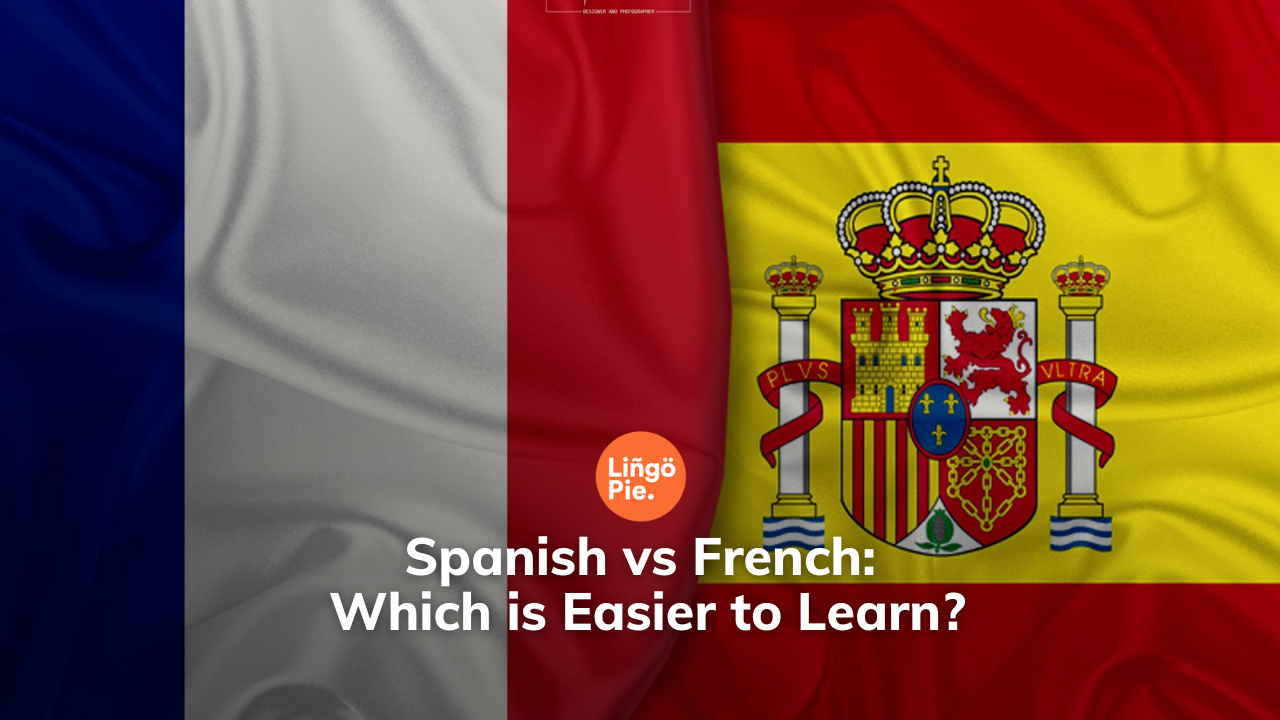If you're thinking about learning Spanish or French in 2025, you're not alone. These two languages consistently rank among the most popular choices for learners worldwide - and for good reason.
There’s a common misconception among English speakers that Spanish is easier to learn than French. But is that really the case? Is French hard to learn? You see, both Spanish and French open up amazing opportunities, from advancing your career to connecting with millions of speakers globally. But if you're trying to decide between the two, you might be wondering: which one's easier to tackle?
That's exactly what we'll explore today. We'll compare Spanish and French across key areas like pronunciation, grammar, and vocabulary. Plus, we'll look at learning resources and cultural factors that could make a real difference in your language journey.
- Why Do You Sound Different In a Foreign Language?
- 8 Best Chrome Extensions for Language Learning
- 8 Best Spaced Repetition Apps For Language Learning

Why Would We Make That Comparison in the First Place?
To the untrained ear, the French and Spanish languages sound totally different, so why would we even compare the two? In fact, the lexical similarity between French and Spanish is about 75%, meaning that a high percentage of the words in these languages are very similar.
For comparison, French and Spanish both share a less than 50% lexical similarity with English. Why is that, you ask?
Well, French and Spanish are both Romance languages, or languages descended from Vulgar Latin, or the colloquial Latin spoken among the lower classes of the Roman Empire.
The 5 major romance languages are:
- French
- Spanish
- Italian
- Portuguese
- Romanian
What's even more encouraging is how these languages rank in terms of learning difficulty. The Foreign Service Institute (FSI), which prepares U.S. diplomats for international assignments, places both Spanish and French in their Category I languages. Translation? They estimate it takes about 24-30 weeks (or 600-750 classroom hours) to achieve professional working proficiency.
| Feature | Spanish | French |
|---|---|---|
| Language Family | Romance | Romance |
| FSI Category | Category I (24-30 weeks) | Category I (24-30 weeks) |
| Number of Countries (Official Language) | 20 | 29 |
| Main Regions | Spain, Central & South America, parts of North America | France, parts of Europe, Africa, Canada (Quebec) |
| Global Status | 2nd most spoken language by native speakers | 5th most spoken language in the world |
| Learning Advantage | Gateway to other Romance languages | Gateway to other Romance languages |
Note: Did you know that you can learn Spanish, French, Italian, and 5 other popular languages on Lingopie. This VOD streaming service boasts great shows and movies in these languages made by native speakers.
French and Spanish Similarities
So, just how similar are French and Spanish? You already know about the shared origin and lexical similarity between French and Spanish, but the similarities don’t stop there.
Let’s start with another obvious one: the alphabet. Both Spanish and French use the 26 basic letters of the Latin alphabet, as does English, though Spanish has 1 extra letter: the “eñe.”
French and Spanish also have some pretty big grammatical similarities. They both have 2 ways to say “you” (formal and informal), 2 versions of the past tense, gendered nouns, and similar verb conjugations, including distinctive subjunctive verb forms.
Another similarity between French and Spanish that sets them apart from English is the use of accents. Both languages use accents over certain letters in words to indicate an emphasis in their pronunciation (although French has more accent marks than Spanish).
These similarities mean that learning French and Spanish at the same time would likely be much easier than learning either of the languages alongside English for the first time.
For someone who already knows French, it might not take too long to learn Spanish as a second language, or the other way around.

Can Spanish Speakers Understand French?
Because of the lexical similarity between French and Spanish, a Spanish speaker reading written French would likely be able to understand a large portion of it, and vice versa.
Here are some examples of similar words and phrases in Spanish and French:
- Country: país/pays
- Bad: mal/mal
- No: no/non
- Repeat: repetir/répéter
- Pardon me: perdón/pardon
However, since the pronunciation and accentuation is so different in French and Spanish, it would be very hard for a Spanish speaker to understand French in a spoken conversation.
If a native French speaker and a native Spanish speaker were trying to communicate verbally, and speaking slowly, they might be able to recognize certain similar words and understand their meanings, but it would be very difficult to go beyond that.

Who speaks faster Spanish or French?
When it comes to speed, Spanish actually takes the crown as the faster-speaking language, clocking in at around 7.82 syllables per second - making it one of the quickest languages globally. French speakers, in comparison, cruise at a more moderate pace of about 7.18 syllables per second.
The difference might seem small on paper, but trust me, when you're a beginner trying to catch every word, those decimal points really matter!
Which Language Is More Useful - French or Spanish?
Like determining whether French or Spanish is easier to learn, the answer to this question is pretty subjective. They are two of the most widely spoken languages in the world. Spanish is the 4th most spoken language in the world, while French is the 5th most spoken.
Top 5 languages worldwide (including native and non-native speakers):
- English (1,132,000,000)
- Mandarin Chinese (1,117,000,000)
- Hindi (615,000,000)
- Spanish (534,000,000)
- French (280,000,000)
While it’s true that there are far more Spanish speakers than French speakers in the world, how useful either language will be depends a lot on where you’re located or where you plan to travel to.
For example, in the Americas, Spanish is far more widely spoken than French. If you live in the United States or plan to travel throughout Latin America, Spanish is probably going to be much more useful to you.

However, if you’re in Canada, or planning to travel or do business there, knowing French is going to be more helpful — it’s the official language of the country, after all. In fact, French is the first official language spoken by more than 20% of the population, most of whom live in the eastern province of Quebec.

Another place where French is more widely spoken than Spanish is in Africa. Outside of Canada, France, and the other major French speaking countries of Europe, all of the top countries where French is an official language are in Africa.
So, if you’re trying to decide between learning French or Spanish for practical reasons, location is probably the biggest factor you should consider.
However, you may also choose to learn one or the other for cultural reasons. For example, if you really enjoy Spanish-language movies or French literature, that may be the deciding factor for determining which language will be more useful to you personally.
5 Reasons Why Neither of the Languages Are Easier to Learn
- They both have sounds that are difficult for English speakers
- Both languages have gendered nouns that affect adjectives, articles, and pronouns
- Spanish and French both use prepositions very differently than English
- There are confusing pairs of words with the same meanings in both languages
- Both Spanish and French have way more tenses and verb conjugations than English
Hopefully, you now have a better understanding of why neither French or Spanish is easier to learn. The fact of the matter is that they share many similarities, and are equally different from English, so you can learn either one as a second language with relatively the same difficulty.
Can you learn Spanish and French at the same time?
Absolutely - and it might be easier than you think! These languages share about 75% of their vocabulary thanks to their Latin roots, which means learning words like "important" (importante in Spanish, important in French) gives you a two-for-one deal. With a streaming service like Lingopie, you can dive into authentic Spanish telenovelas one day and binge French cinema the next, making the learning process not just doable but actually fun.
Want to tackle both languages successfully? Here's your game plan:
- Start with one language for 2-3 months to build a foundation
- Use separate learning tools - different Lingopie playlists for each language
- Schedule distinct study times (maybe Spanish mornings, French evenings)
- Keep separate notebooks or digital notes for each language
- Practice speaking on different days to avoid mixing them up
- Give yourself daily goals: an hour per language is a good target
Remember to cut yourself some slack - yes, progress might be a tad slower than focusing on just one language, but hey, you're learning two languages instead of one. That's pretty impressive in anyone's book!
What Is the Best Way to Learn either French or Spanish?
The best way to Learn Spanish or learn French can vary greatly depending on your style of learning and personal preferences. But we do think that one of the most effective ways for anyone to learn a new language is by watching TV shows and movies in that language.
Wait, you can learn a language by watching TV?! Absolutely!
Absorbing information from TV and movies is one of the ways we learn our native languages so fast growing up, so it stands to reason that you can do the same to learn a second language.
Lingopie: Making French or Spanish Easier to Learn
On Lingopie, we have thousands of hours of excellent international television in both French and Spanish, so you can binge on great series while you learn along the way.
Whether you’re just starting out or have been learning Spanish or French for a while, you can choose from your favorite shows, including netflix ones, for all ages to match your level in either language.
Every show is streamed with subtitles in its native language, and every word, phrase, or bit of slang is clickable, giving you real-time translations of vocabulary you don’t understand.
You can also choose to follow along with English subtitles or slow down the playback speed to make sure you catch everything.
When you finish an episode, you can instantly review everything you just learned with built-in flashcards and word lists.
So, what are you waiting for to give Lingopie a try today? Signing up is totally risk free. You can start a free trial and cancel your subscription at any time if you decide Lingopie isn’t for you — though we’re sure that won’t be the case!
FAQs: French vs. Spanish – Which Language Should You Learn?
Is French or Spanish more useful?
The usefulness of French or Spanish depends on one's individual goals and geographical interests. For business and travel in Latin America, Spanish is more advantageous. However, French is spoken in various parts of Africa, Canada, and some Pacific islands. Both languages are global and have their own areas of influence.
Is French or Spanish easier to learn in high school?
The difficulty of learning a language varies from person to person. Some may find Spanish pronunciation and regular verbs easier, while others might find French grammar more straightforward. High schools typically offer comprehensive programs for both languages, so the learning experience often depends on the individual student and teaching methods.
Should my child learn French or Spanish?
This decision depends on your child's interests and future aspirations. If they're keen on traveling or working in Latin America, Spanish would be ideal. However, if they're interested in regions like Africa or Canada or even some international organizations, French might be the better option. It's essential to understand your child's preferences and future goals.
Is French or Spanish more useful in Europe?
In Europe, French is an official language in France, Belgium, Luxembourg, and Switzerland, making it widely spoken. Spanish is mainly spoken in Spain. For broader communication within Europe, French may have a slight edge, but both languages are highly respected and useful, especially in business and tourism contexts.
What's the best way to learn French or Spanish effectively?
Watching TV shows and movies in Spanish or French can be highly effective. Platforms like Lingopie offer series in both languages with clickable subtitles for real-time translations, aiding in the learning process.
It's important to note that both languages have their own unique charm and advantages. The best decision often aligns with personal interests, goals, and geographical considerations.
Related:

Summing Up
In the vibrant debate between learning French and Spanish, both languages emerge with their own set of advantages, challenges, and cultural richness. While some believe Spanish's phonetic nature makes it easier to grasp, French offers its own unique charm and straightforwardness in conversational fluency. The lexical similarities between the two, rooted in their shared Romance language heritage, create a fascinating linguistic bridge.
Whether you're inclined towards the rhythm of Spanish or the melody of French, the choice ultimately hinges on personal interests, geographical considerations, and individual learning experiences. Dive into either language, and you're set to embark on a rewarding linguistic journey, unlocking new cultural doors and perspectives.







![How Many Italian-Speaking Countries Are Out There? [2025 Data]](/blog/content/images/size/w300/2025/06/Italian-speaking-countries.jpg)


